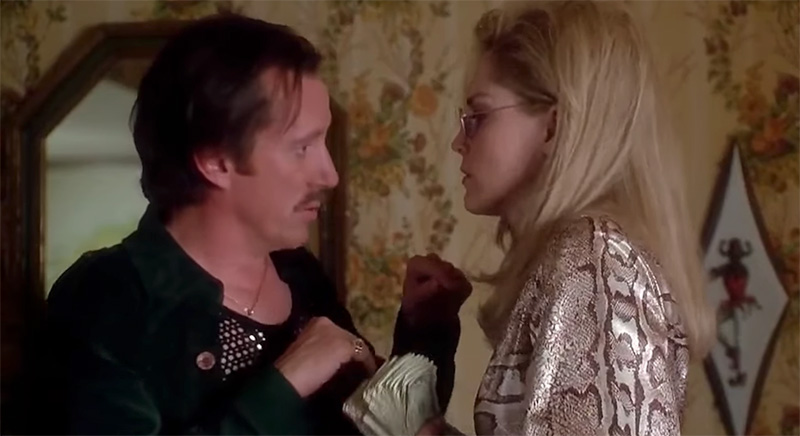
Martin Scorsese’s “Casino” is a cinematic exploration of ambition, power, and human frailty set against the glittering backdrop of Las Vegas.
Two characters that stand out in this intricate narrative are Ginger McKenna and Lester Diamond. Their relationship, rooted in the pimp/prostitute dynamic, is a testament to Scorsese’s ability to craft complex characters that captivate and resonate.
The Pimp/Prostitute Dynamic
At its core, the pimp/prostitute relationship is one of power and control. The pimp, often using a combination of manipulation, intimidation, and sometimes genuine affection, exerts control over the prostitute.
This control can be financial, emotional, physical, or a combination of all three. The prostitute, often coming from a background of vulnerability, becomes dependent on the pimp for survival, both emotionally and financially.
Lester as the Archetypal Pimp

Lester is the quintessential pimp – manipulative, controlling, and always on the lookout for opportunities to exploit.
His relationship with Ginger, which began when she was young and vulnerable, is a testament to his ability to identify and prey on weaknesses.
Throughout their relationship, he maintains a manipulative hold over her, using emotional blackmail and exploiting her weaknesses to ensure her loyalty.
While Lester is often seen as the puppet master in his relationship with Ginger, he too is emotionally dependent on her. She represents a connection to a world of luxury and affluence that he desperately craves.
Lester’s survival in the cutthroat world of Las Vegas is due to his cunning and opportunistic nature.
He is adept at reading situations and people, allowing him to maneuver himself into advantageous positions.
Even as Ginger’s circumstances change, Lester’s influence remains, a testament to the deep psychological hold he has over her.
Ginger’s Struggle

From the moment Lester met Ginger, he saw a “long-legged little colt” with “stupid braces on [her] teeth.” This early encounter, at the tender age of 14, set the stage for a relationship marked by manipulation, dependency, and power dynamics.
Beneath her confident exterior lies a woman grappling with deep-seated insecurities and emotional turmoil. Her dependency on Lester, despite his exploitative nature, speaks volumes about her need for validation and emotional support.
Ginger’s relationship with Lester is a classic representation of the internal conflict many prostitutes face.
On one hand, there’s a deep-seated dependency on the pimp, rooted in past traumas and the belief that they can’t survive without him.
On the other hand, there’s a burning desire for autonomy, freedom, and a life away from the shadows of the past.
Ginger’s interactions with Lester, juxtaposed with her relationship with Ace, highlight this tug-of-war between her past and her aspirations.
The Emotional Complexity of the Pimp/Prostitute Bond
While the relationship is inherently exploitative, it’s essential to understand that genuine emotions can and do exist in the pimp/prostitute dynamic.
Ginger’s attachment to Lester isn’t just about dependency; there are genuine feelings involved, making their bond even more complex.
Lester, in his twisted way, might also have genuine affection for Ginger, further blurring the lines between manipulation and genuine emotion.
Shifting Power Dynamics
As the narrative unfolds and Ginger becomes involved with Sam “Ace” Rothstein (Robert De Niro), the power dynamics between her and Lester begin to shift.
With her marriage to Ace, Ginger gains financial stability and a higher social standing.
However, despite her newfound status, the emotional chains that bind her to Lester remain unbroken, leading to intense and volatile confrontations.
The characters of Ginger McKenna and Lester Diamond in “Casino” are masterfully crafted portraits of human complexity.
Their bond serves as a poignant reminder of the lasting impact of early-life relationships and the intricate dance of power, control, and emotion.
While the neon lights of Las Vegas shimmer in the background, it’s the human stories, with all their complexities and contradictions, that remain etched in the viewer’s mind.









